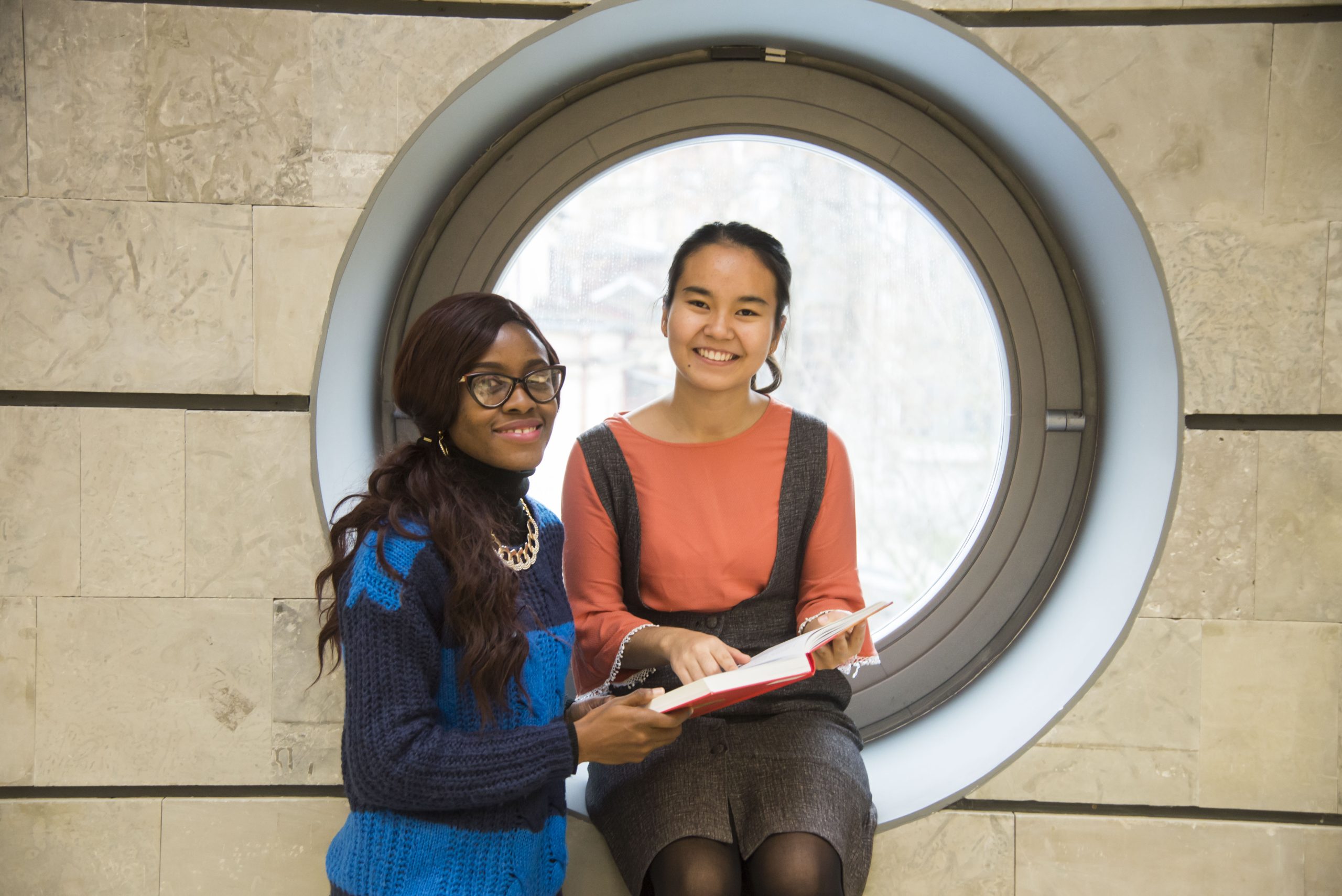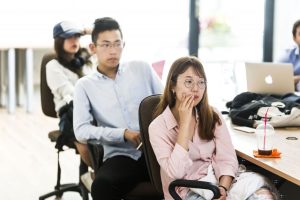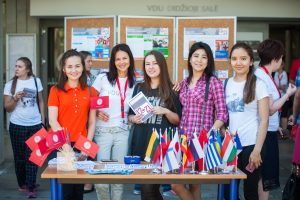The Most International University VMU: Opportunities for Students

Did you know that more and more foreign students are studying Lithuanian at Vytautas Magnus University (VMU)? And that students of any major can choose to study a foreign language from more than 30 offered?
Assoc. Prof. Vilma Bijeikienė, Vice-Rector for Communication at VMU, discusses the importance of language skills and a multicultural environment, not only for getting acquainted with the achievements and innovations of other countries but also for promoting the Lithuanian language, culture, and scientific accomplishments.
From English to Farsi
“Openness to languages and cultures, cooperation with foreign partners, and exchange programmes for students and teachers signify that the university fosters internationality and scientific progress. Foreign students and staff make up about 20% of the VMU community, and approximately 25% of study programmes are taught in English,” says Assoc. Prof. Bijeikienė.
She points out that internationality in higher education can be divided into two segments: internationality at home (fostering an international environment at the university) and international academic mobility (student and teacher exchanges, studies and internships abroad, and international summer schools).
“Through Erasmus+ and bilateral exchange programmes, students have the opportunity to pursue part-time studies and participate in short-term courses at more than 700 universities in 78 countries worldwide. Every year, more than 200 VMU students take advantage of this opportunity. Students can undertake internships lasting from 1 to 6 months in companies and organisations across the globe, as well as in Lithuanian communities and Lithuanian heritage schools abroad. More than 160 VMU students and graduates venture abroad for this purpose each year,” says Bijeikienė.
“One of the main components of VMU’s internationalisation development is the opportunity for students, teachers, and non-academic staff to learn foreign languages. Thanks to the Artes Liberales study model, we have created favourable conditions for students to learn languages, regardless of their study programmes. According to our university’s study model, foreign languages are integrated into both compulsory and elective credits in all first-cycle and integrated study programmes. Students can choose from 30 offered languages,” says the associate professor.
She explains that in addition to the commonly chosen languages in Europe, such as French, Spanish, and German, the university also offers less commonly taught languages. If there are enough interested students to form a group, you might even hear Farsi, Ancient and Modern Hebrew, and Kartvelian languages being taught in the classrooms. And just recently, the university started offering Ukrainian language courses.
“While it is impossible to learn all languages, establishing a certain language learning foundation during student years can significantly ease the process of learning other foreign languages in the future. For example, English is a compulsory competence for all students at VMU. At the same time, it is a gateway to learning other languages since it can be used as a basis for learning Germanic and Romance languages, as these languages have certain similarities. If you learn, let’s say, German, it will be easier to learn Norwegian or Swedish in the future,” says the Vice-Rector.
Language as a gateway to intercultural understanding and higher salaries
“Linguists and anthropologists have long established the theory of linguistic relativity. This means that language influences our thinking, worldview, and perception of the world. Therefore, relying solely on the English language is not enough to create an inclusive, multilingual, and multicultural environment. Language proficiency is not just a means of communication; it is also a competence that allows us to empathise with others and understand how culture is revealed through language,” says Assoc. Prof. Bijeikienė.
The VMU Vice-Rector for Communication notes that although the world is becoming more globalised, cultures are intertwining, and we ourselves are becoming multicultural, cultural differences related to our native languages still do exist.
Assoc. Prof. Bijeikienė provides data on the pragmatic benefits of language proficiency: “Knowing languages other than English increases the likelihood of obtaining a better job and a higher salary; in Lithuania, this amounts to around 15–20%.”
The Vice-Rector emphasises that language learning also develops creativity and the ability to express oneself. “Linguists have proven that knowing and actively using languages improves cognitive abilities across the lifespan, from early childhood to old age, and helps prevent dementia. Additionally, multilingual schoolchildren are able to complete a wide range of tasks more easily than their monolingual counterparts,” she points out the benefits.
And although there is a popular belief that mastering a language is only achievable in childhood, Assoc. Prof. Bijeikienė argues that this myth should be dispelled.
“Learning and mastering languages is possible at any age, but it’s just easier during childhood as the skills acquired then significantly aid language learning in adulthood. The student age is also highly favourable for language learning,” the Vice-Rector explains.
The number of foreigners choosing to learn the Lithuanian is increasing
When discussing internationality at VMU, Assoc. Prof. Bijeikienė emphasises that learning and using languages represent only one component of internationality.
“We place great importance on creating an inclusive communication and study environment that allows students from diverse linguistic and cultural backgrounds to successfully integrate into the study process. After all, our university has students from around 80 countries, each bringing their own cultural foundation. Therefore, one of our most important objectives is to create favourable conditions for students to recognise and embrace the VMU study culture,” says the Vice-Rector.
She says that achieving this goal is facilitated by well-functioning mentor, VMU ambassador, and various introductory programmes, which allow students to get acquainted not only with the entire university infrastructure and environment, but also with the study model.
“It is important for us to involve international students in collective activities with Lithuanian students. We have numerous language and culture clubs, and they collaborate to organise various events and create various activities,” says Prof. Bijeikienė, discussing the realities of fostering a university community.
To promote inclusivity, there are opportunities for Lithuanian and international students to study together in groups. The courses are taught in both English and Lithuanian, enabling many foreigners to learn Lithuanian.
“While Lithuanian language is not compulsory, it is strongly recommended. We are delighted that more and more foreigners are learning it, and some are even continuing their studies in Lithuanian,” says the Vice-Rector.
When discussing interaction with the outside world, Bijeikienė is delighted that international businesses are also engaging in the VMU study process. Lecturers from various international companies based in Kaunas deliver lectures, share information about the necessary competences, and invite students to undertake internships.
“I still remember a beautiful instance of cooperation with state institutions: when Lithuania faced an influx of illegal migration from Belarus, VMU international students who spoke various Middle Eastern languages became interpreters,” Assoc. Prof. Bijeikienė recounts recent events.
A multicultural environment favourable for the preservation of less-spoken languages
The VMU Vice-Rector notes that in today’s global world, the interaction and blending of languages and cultures is inevitable.
“For us, as for other small nations, this could lead to an unwanted outcome – homogenisation. We are therefore well aware that studying in English does not constitute internationality. We want students to understand that English merely serves as a means of communication and is by no means a substitute for our native language. We want the Lithuanian language to be recognised and visible globally and used in the fields of science and academia,” says Assoc. Prof. Bijeikienė.
She points out that studying in a multilingual environment is precisely the key to understanding that multiculturalism and multilingualism are assets that we must foster: “In educating our students, we strive for sustainable multiculturalism. We want them to enter the world with a profound understanding of the importance and value of their native language as well as other languages and cultures.”
Assoc. Prof. Bijeikienė believes that this is the direction in which the entire state policy should be oriented: “From the perspective of the university, as one of the actors in the national context, it is important for us that higher education is as widely open to internationality as possible.”
According to the Vice-Rector, attracting teachers, researchers, and young talents from abroad and creating favourable conditions for them should be one of the country’s priorities: “The state should follow the lead of universities and pay more attention to the development of internationality.
We need to position Lithuania as a country with high-quality higher education, attracting both students and researchers. Currently, we haven’t fully exploited the potential of higher education in Lithuania, which is particularly important for a small country like ours.”
Internationality at university – success in life
Assoc. Prof. Bijeikienė says that internationality at university develops certain relevant student competences:
“Firstly, flexibility and the ability to adapt to different situations and perceive otherness in a broader sense – not just as linguistic or cultural otherness, but also as the capacity to listen and understand varying perspectives and ways of thinking. It also involves the ability to present oneself more flexibly and diplomatically.”
Secondly, studying in a multicultural environment develops the ability to bring people together and work in teams.
“When you are used to working in various projects with different people, you become more flexible, skilled, and creative in performing various tasks, and tend to foster innovation in the work environment. Openness and the ability to recognise and embrace differences are crucial competences in today’s world,” says the Vice-Rector.
Article by news portal Delfi.lt















